Today I’m going to share with you a bit more info on the Blum Family.. If you remember from the previous post on the Blums there was mention of a Carl Schurz….that little bit of information will come into play in this post.
During the Baden Rebellion, my great grandmother, Louise Moesinger Blum closely followed all news about Carl Schurz. She told her son Martin (my great uncle) that her father, George “Carl” Moesinger (b 21 Mar 1826, Germany d. 8 Jul 1866 Baden Germany) had escaped to America or South America. All of the succeeding years, Martin researched for more information about his grandfather. He scanned Schurz’s auto biography (three volumes) in hope to find a trace of him. He felt perhaps he might find him among the civil war veterans as he was a lieutenant in the Prussian Army.
In 1983 Martin visited Germany with his brother William resolved to continue his research. He visited kin of his mother. They too believed that Carl had escaped to America, and knew nothing of grandfather. Carl had escaped the battle ground and returned to the native village of Kondringen. Mum was the word in the village. He could carry on the business of innkeeper. His father, Johann George Moesinger was innkeeper before him and stayed on as butcher. They were relatively well to do and prosperous.
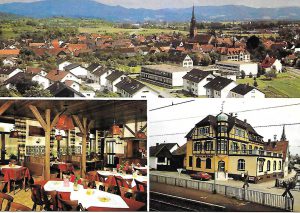
The Inn still stands. It was built in 1550 and Rebstock was it’s name. Within a stone’s throw was the Blum home. It was built in 1814 by Andreas “Andrew” Blum who was born Nov 28, 1782 in Kondringen, Germany. A.B. 1814 is carved above the door. His grave stone is in the wall around the cemetery though the year of his death, April 14 1847 was not legible. The house at that time was occupied by Martin’s first cousin Fritz Blum, his son Alfred and Alfred’s wife Emmi.
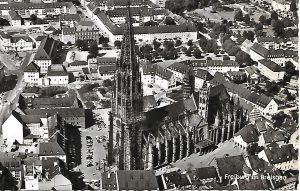 While there, in Germany, Martin visited the parsonage next to the Rebstock. There all records were complete. The parson had adequate forewarning and Martin had made clear that he wanted to know what happened to his grandfather George “Carl ” Moesinger. He had met with the preacher early in his visit and found him fully prepared. This is the day Martin learned that his grandfather was buried July 8, 1866.
While there, in Germany, Martin visited the parsonage next to the Rebstock. There all records were complete. The parson had adequate forewarning and Martin had made clear that he wanted to know what happened to his grandfather George “Carl ” Moesinger. He had met with the preacher early in his visit and found him fully prepared. This is the day Martin learned that his grandfather was buried July 8, 1866.
“Impossible!” he exploded
Many thoughts raced through his mind as the preacher reread from the church records. ” Carl Mossinger—Rebstock innkeeper was buried July 8, 1866.
Between 1866 and 1881 were very trying years for the Mossinger (pronounced Maysinger) family. That included Martin’s grandmother Caroline (Jenne) Mossinger (b 16 Aug 1822 Germany d. 4 Jun 1905 South Bend, Nebraska) , great grandfather, perhaps his uncle Adolf who was 18 years of age in 1866, and successively the younger children, Aunt Minnie, Aunt Caroline, Uncle Gustav, Uncle Emil and his mother , Louise, who was six years old.
The family was literally held hostage. The Rebstock was commandeered for the purpose of spreading the net for the capture of Carl. At Carl’s disappearance his wife most fervently hoped and prayed for his successful escape. It would have been simple to escape into Switzerland as many other had escaped before including Carl Schurz of whom I have written earlier. It was even possible to escape into France which required crossing the Rhine River.
In 1866 Prussia was at war with Austria. Carl could have reached Austria through Wurttemberg whose provincial king sided with Austria.
The family hated and mistrusted the military people who occupied the whole second floor of the Inn. They made the second larger room upstairs a court room. It is reasonable to expect that the family may not have believed reports that Carl was slain.
Profits fell from the first floor of the inn and also from the slaughter house and meat market. This property was adjacent to the inn and operated by Carl’s father Johann. Taxes were immediately raised as the grand duke was out to confiscate the property obviously.
In 1867, foreclosure was begun. Naturally, court house records make the foreclosure appear like an ordinary foreclosure. Those records unmistakably reveal the occupation of the inn entrance and the second floor by the military.
In 1870, Prussia was at war with France. The proximity of the Rhine, the border between the two countries, caused all people on both sides constant fear and concern.
In 1881, a buyer was found for all the property including that of Johann Mossinger. Louise at the age of 21 emigrated from Germany.
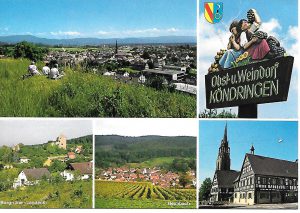
The first chapter of our Blum/Mossinger family history may be concluded at this point.
However one point is missing…how did Andrew Blum get to America? He never dwelt on the past. His was a three word slogan, “ALWAYS STRAIGHT AHEAD.” Hence, he never dwelt on the past. Martin looked at records kept by the Mormon Church for clues. All he could offer was a guess that his dad boarded a steamer in Europe and stoked coal in those fires that generated the steam for motors to propel the ship. We much recall that Andrew had a strong well muscled back. Polk’s city directories list him as a maltster for breweries in Council Bluffs and Omaha. (since Martins visit to Germany ship records have been found)
He had worked in Cincinnati brewers and New York as he migrated westward. That he was physically able to fire steamer engines we are certain.
In 1900 Andrew saw an 80 acre farm near South Bend, Nebraska. The plentiful water, the fruit trees, the grape vinyard, even the hills were too much for him. Nostalgia and sentiment carried him back to his native Baden home. He had always claimed South Dakota was too like a soap bubble. You could have a bumper crop in the fields to be “burst” by hail, drought and grasshopper. He parted with his sheep, two 160 acre tracts in South Dakota, at a loss, and brought his family to Nebraska.
In the summer of 1935, at the age of 84, he still hoed his vineyard. He used a nigger hoe which was heavier and larger than our common hoe. That hoe derived it’s name because purportedly slaves were forced to use them in cotton and tobacco fields.
The day that Martin and his brother William “Bill” were in the parsonage, Martin mentioned that according to legend Carl Schurz had frequently visited the Rebstock. The pastor instantly recognized that he had a newsworthy story. Carl Schurz is now propagandized as a heoic ‘freedom fighter.” We are told that military establishments are now named after him.
As a result, Bill and Martin were photographed on the steps to the parsonage. A newspaper article was written in the Freiburg newspaper with their pictures.
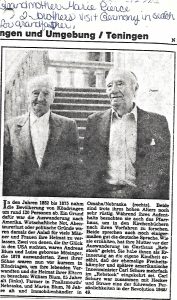
The paper reads:
In the years from 1852 till 1875 the population of Kondringen has dropped about 120 people. The miseries in the country , the people’s wishes of adventure, and political aspects were the reasons why many men and women left their home and went to the USA. Tow of the people who wanted to find a happines in the USA were Andreas Blum and Louise Mosinger. They went to the USA in 1876. Two of their sons were in Germany recently to visit their relations and to look for the home of their parent; William Blum, 85 years old (left side) farmer in Plattsmouth, Nebraska and Martin Blum, 78 years old, a trader of houses and fields in Omaha, Nebraska. In spite of being very old the two men have a very good health. During their holiday they visited the house of the Parson to look in the old books of the church to see if they can find some dates of their relations. Both are speaking more or less good German lanuage. As they told, their mother lived in the Rebstock. Their parent told them from the famous “fighter for liberty” Carl Schurz who visited the Rebstock very often. Carl Schurz was together with Hecker and Sturve one of the main famous people in the revolution of 1848/49.
(translation of Martina from Kondringen)
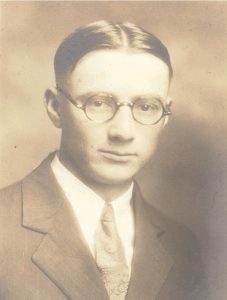
1905–1989
BIRTH 8 MAR 1905 • South Bend, Nebraska
DEATH 7 JAN 1989 • Omaha, Nebraska
Special Thank You to my great uncle Martin Blum for having the foresight to save what he knew about the family and hand it down to someone who cares to keep the History alive for generations to come.
I hope you are all enjoying the history. If yes, leave me a message. If you have information that I’m not aware of please share with me as I share with you!
Thanks for reading!
Happy Hunting!
Your Pierce (and Blum) family Historian
Susan Pierce Holmes!

I found a Johann Georg Mossinger during geneology research on my family. Born before 1730 in Rotterdam-Rheinland Pfalz Germany and died 1800 in North Carolina. He appears to be the father of a Conrad Messinger who is the father of a Catherine Mysinger (oh my all these spellings) who was married to my third great grandmother Eve Ricker’s father, Jacob Ricker. I think last names were often spelled phonetically by whoever was hearing the dialect!